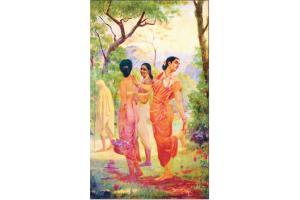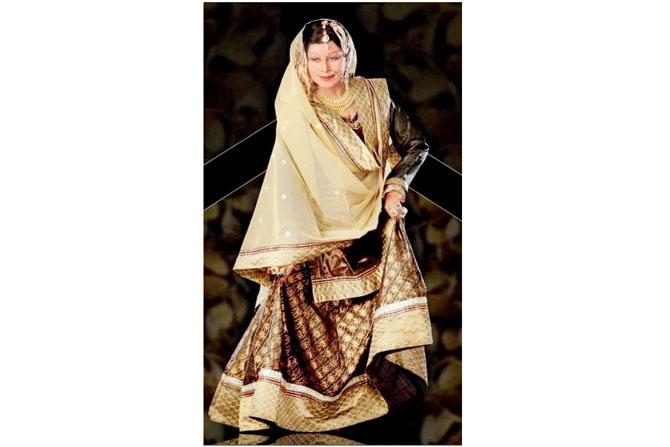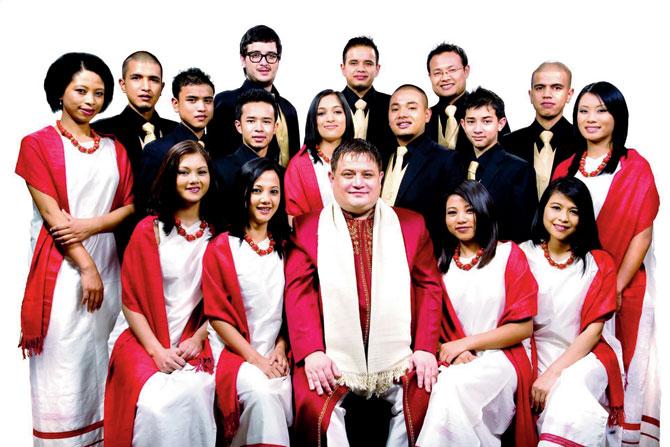Having made a profound impact on the West in the 18th century, Kalidas's Shakuntala comes full circle with a concert that brings together Schubert's opera based on the drama, through an Austrian conductor and orchestra, and an Indian choir

Raja Ravi Varmau00c3u00a2u00c2u0080u00c2u0099s portrayal of Shakuntala
Often hailed as the greatest Indian writer of any epoch, Kalidasa — "a memory of perfection that neither Sanskrit nor the Indian aristocracy would know again", as Britannica describes him — immortalised his genius in Sanskrit dramas and epic poems. Among these works, Abhijnanashakuntala is considered to be the greatest Indian literary work of any period. Such were the emotions evoked by his depiction of the poignant tale of Shakuntala and Dushyant that 13 centuries later, when Sir William Jones revealed it to England through his translation (published in London in 1790, making it reportedly the first Indian play to be translated into a Western language), its ripples reached France, Germany and Austria among other European nations.
ADVERTISEMENT

Shovana Narayan
In fact, the impact went beyond the realm of literature (German writer and poet Goethe's fascination with Shakuntala is one of the major reasons behind its interest in the West), and spread to the world of music. In 1820, legendary Austrian composer Franz Schubert wrote Shakuntala, an unfinished opera in three acts. More recently, a few composers have completed the opera and staged it, but never before has a performance been as close to the original work as the audiences in Delhi, Kolkata and Mumbai are set to witness this week.
An initiative of the Austrian Embassy, Shakuntala is a collaborative performance that brings together president of the renowned Vienna Boys' Choir, Professor Gerald Wirth, an Austrian chamber orchestra, the award-winning Shillong Chamber Choir (SCC), and eminent kathak dancer Shovana Narayan. The aim is to celebrate the cultural ties between both countries, and celebrate Austria's Presidency of the European Union in 2018.
Preparations began this May when Wirth came down to India to familiarise SCC members with the opera fragment. His aim was not to complete the piece, but to flesh out the orchestration instead. "The scores that Gerald brought were given to us as Schubert had himself written them; in clef [a symbol at the beginning of a line of printed music that shows the pitch of the notes on it] that we found very difficult to read. So, he taught us how to interpret this kind of music," explains SCC's lead tenor William Richmond.

Shillong Chamber Choir
What wasn't difficult, though, was the choice of the Indian music group for the concert. SCC has collaborated with the Vienna Chamber Orchestra for several performances including one in Umaid Bhawan, Jaipur, in the past. Besides, despite being known as a pop band, they have a background in western classical music. "We initially thought this was a huge task. But they had so much faith in us that soloists from our choir will perform all the solo pieces. Soprano Ibarish Lyngdoh will play Shakuntala," says Richmond.

Professor Gerald Wirth
To depict the German libretto on stage, Narayan will be performing several scenes from the tale including Shakuntala lost in thought and the subsequent curse by Durvasa, Dushyant and Shakuntala's moving dialogue in his court and the scene when they reunite. "I have been well aware of this piece since the time I met my dear husband," she says, referring to Dr Herbert Traxl, former Austrian Ambassador to India. Known for her collaborative works with leading ballet and flamenco dancers, Narayan says that though the language of performance is not Sanskrit or Hindi, the emotions remain the same. "When different cultures come together, the common link is the emotions," she shares.
Richmond agrees. Though the musical treatment of the piece is for a Viennese audience of western classical music, Schubert treats the mood of the universal story beautifully. But interpreting the three-century-old German score wasn't the only challenge. "We had no reference point. This is something that we are going to have to sing in front of hundreds of people — at the NCPA, it's going to be over 1,000 people — without microphones. So the main build-up was of course to learn the song, and also to work on our voices to be able to project the songs for an hour and 15 minutes, which demands a lot," he admits.
"Having said that, to be a part of a world premiere of a concert of this kind is a once-in-a-lifetime opportunity," Richmond says. "The nerves are there but the excitement is overwhelming."
On: October 6, 7 pm
At: Jamshed Bhabha Theatre, NCPA, Nariman Point.
Call: 22824567
Entry: Rs 500 onwards
Catch up on all the latest Crime, National, International and Hatke news here. Also, download the new mid-day Android and iOS apps to get latest updates
 Subscribe today by clicking the link and stay updated with the latest news!" Click here!
Subscribe today by clicking the link and stay updated with the latest news!" Click here!






